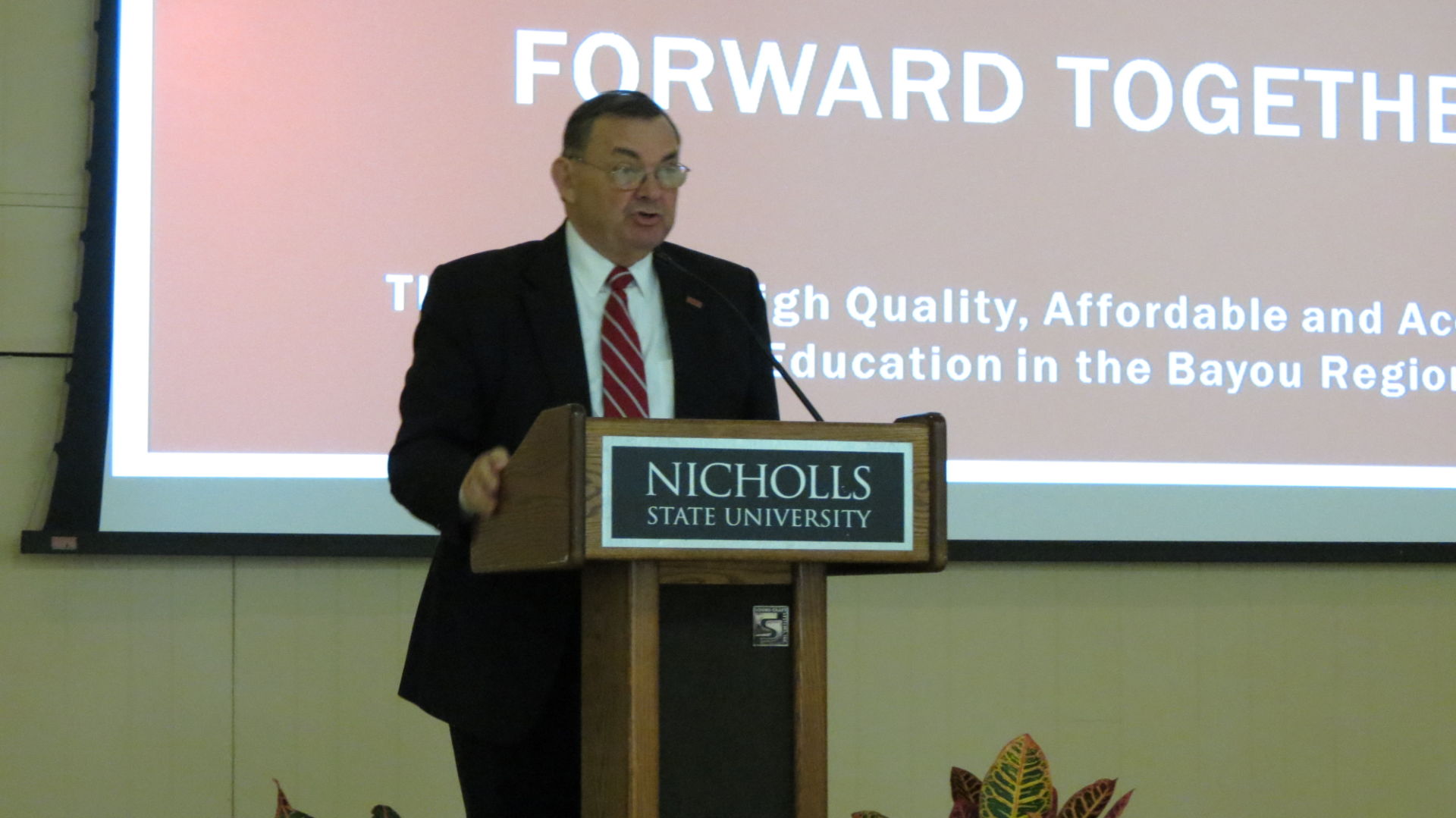
3 locals still alive in chase for hoops state title
February 24, 2015
Terrebonne partners with state, CDC on anti-bioterrism drugs
February 24, 2015While the Louisiana legislature gets set to review Gov. Bobby Jindal’s annual budget, dollars for higher education continues to find itself on the chopping block.
As an undedicated fund due to the state’s citizens not protecting it through constitutional statutory dedication, higher education is one of a few pots of money our state’s government has the ability to take money from. And when shortfalls come, like the current $1.6 billion one – money can be taken from those unprotected pots or taxes can be raised.
Money being taken, of course, has been the prevailing trend, and that has resulted in fewer and fewer dollars in the hands of Louisiana college presidents since 2008. Eight years ago, the state funded 63 percent of Nicholls’ annual budget, and the university made up the remaining 37 percent. After continual gradual declines in state resources, those percentages have roughly reversed as Nicholls contributed 68 percent of the annual budget in the 2013-14 academic year, with 32 percent coming from the state. In that time, tuition has nearly doubled from about $3,595 to $6,468.
“We used to be state funded. Then we were state supported. Now we’re state located,” Nicholls State University President Dr. Bruce Murphy said at a public presentation last week.
It is unclear exactly how much state universities like Nicholls are going to lose as the budget goes through the legislature, but Murphy likened it to south Louisiana’s relationship with hurricanes in that the state does not know when, where or how powerful they will hit, but they are an inevitability.
“It would be absolutely not only premature but probably irresponsible to start talking about we’re going to cut this, we’re going to cut that. We don’t know what it is,” said Murphy, who added that he and other university presidents likely won’t know the extent of the cuts until late April at the earliest.
Instead of raising tuition, something Murphy expressed his opposition to, he said his primary goal is to increase enrollment to 8,000. It currently sits at about 6,300 after being as high as 7,184 in the 2009-10 academic year.
Nicholls thinks it can grow enrollment by many thousands by targeting specific populations such as culinary, petroleum services, Nicholls online, out of state and international students.
“Nicholls believes it can grow enrollment to 8,000 by targeting specific populations such as culinary, petroleum services, Nicholls online, out of state and international students,” said the university president. “However it is clear that to increase enrollment, Nicholls must also slow the increase in tuition and fees. Over the last five years enrollment has steadily decreased as student costs have increased. I believe that’s called economics 101. Some of my colleagues at other universities have called for authority to raise tuition and I have resisted that. I think that we have increased tuition about enough on our students and I don’t see that as the answer to any of our situations.”
Murphy added that Nicholls is exploring several innovative ideas that will help stabilize student costs such as increasing retention and graduation rates and enhancing the student experience, however he acknowledged that those ideas are dependent on no further cuts to higher education.
Murphy presented many stats regarding the importance of higher education, supporting his argument that the state does not value higher education enough. They included a 100 percent boost in the lifetime earnings of someone with a college degree, compared to someone without one. Higher incomes would equate to more taxes flowing into the state’s budget. Higher employment rates for graduates were presented as 87 percent compared to 79 percent for those with one to three years of college experience, 68 percent for high school graduates and 46 percent for high school drop outs and lower incarceration rates for college grads at one in 100 compared to one in 35 for high school grads and one in 10 for high school drop outs.
“Also college graduates present a smaller burden on the health care systems. They get divorced less. We at Nicholls believe higher education is vital to the future growth and health of the people of Louisiana. We believe and by all definitions higher education is a public good. State funding cuts to higher education affect more than university budgets. Cuts to higher education mean fewer college graduates,” Murphy said.
Many point to the current price of oil at about $50 per barrel as the reason for cuts, however Murphy, as well as local legislators, called it a spending problem, not a revenue problem.
“We have a spending problem. Not a revenue problem, and I’ll defend that till the day I die cause we can fund higher ed if we spend money properly in the state. We choose not to do it, and that’s a problem,” said District 55 State Rep. Jerome “Dee” Richard (I-Thibodaux). “We do not fund higher education like we should. Tuition has been raised, but I don’t think that’s the answer to keep raising tuition because it causes taxpayers to keep their kids out of college. We’re going to tuition ourselves out of this business. It’s time that the state fund them, which we’re not doing right now.”
Murphy illustrated this argument by showing that of the nation’s top 10 producing, seven are in the top 26 including all are in the top four in the smallest reduction in state spending per student from 2008 to 2014. Louisiana was last. Montana, Wyoming, North Dakota and Alaska were the top four.
“I don’t blame the current governor. I don’t blame the current legislators. They respond to what the people say, so they respond to what people are interested in,” Murphy said.
But these cuts haven’t been without the push back of some in the legislature, including Richard.
After several years of trying, Richard finally got a bill to increase funding for higher education passed through both houses only for it to get vetoed by Jindal. The bill, which Richard called a good short-term solution that might have handed higher education $100 million in one year’s time, the bill would have cut 10 percent of state contracts.
“Each one is going to have to be reviewed by a committee and if they feel that contract is wasted money, that money goes directly to higher ed,” Richard said.
The bill passed House and Senate. Despite there being no opposition in the legislative branch of government, Jindal vetoed it and the legislature chose not to pursue overriding the veto.
Dr. Bruce Murphy discusses possible budget cuts at Nicholls State University Thursday









